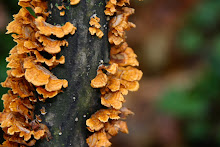
In the hour and a half it took us to walk through the woods today, about 87,500 gallons of oil poured out of BP’s ruptured Deep Horizon well into the Gulf of Mexico, and in the coming week the last Hummer H3, that arch-symbol of humanity’s earth-indifferent, oil-addicted narcissism, will roll off the assembly line -- ironically at the Shreveport, Louisiana, GM plant -- and it feels like something is about to happen, and it feels like nothing is going to change.
Everywhere in the woods are signs of insatiable hunger: Leaves notched by insects. Random paths of leaf tracers tunneled through broad leaves. Spiders crouched on webs or on top of leaves, waiting. Metallic green beetles mating and feeding.

But the hunger found in the woods is limited by need, curbed by the physical limits of jaw strength and stomach size, necessitated by biology. Human hunger is a different thing.
When all we want is more, our lives spin out of balance, out of control, and we destroy everything near us. And given the reach of our powerful technologies, everything is near us. Lao Tzu wrote, “Knowing others is intelligence; knowing yourself is true wisdom. Mastering others is strength; mastering yourself is true power. If you realize that you have enough, you are truly rich.” But we distrust. We distrust, mainly, that we can maintain the ties necessary for survival, and, like a spoiled teenager, have come to hate those we depend on. Absorbed, as we are, in a society grounded in the illusion of independence, we fear our need for other people. Haunted by our fear of poverty, we impoverish ourselves even more and deepen our cravings.

The current fashionable economic model views consumers as amoral beings who make decisions based solely on rational self-interest, but there are many of us who wonder about the morality of our choices, and many of us find it more and more impossible to ignore the damage caused by our endless consuming. Many of us are coming to realize that, like the disease that shared the name, consumption is laying waste to our only planet’s body.
I hear from some people that we can’t blame BP or Transocean or any corporation for the devastation that is occurring in the Gulf, because we all use oil and, so they argue, unless we are willing to give up all use of petroleum immediately – an act which they know would be impossible to achieve – we shouldn’t complain. But an obsessive emphasis on personal responsibility, to the exclusion of larger political and social forces, is the main weapon that polluting corporations like BP use against the rest of the world. If everybody’s responsible, then nobody’s responsible, and the status quo can remain intact.

When you are alert, you can’t help but be humbled every time you walk in the woods.
Sometimes you feel dwarfed by the size and age of the trees or by the resilience of the life that persists in spite of storms and drought: spiders who quickly re-spin their webs after a rainstorm; mayapples and red chestnuts turning a blotchy yellow with their leaf tips dried and brown, and still thriving; grape vines looping from tree to tree – carrying the memory in their curves of old trees now fallen and completely rotted to earth.

Today, it is the miracle of plants drawing on the sunlight that falls freely through the forest canopy that is humbling to me. How clever are we, really, to have spun these vast webs of highways and networks that refrigerate food for the 1,500 miles it takes to carry our dinners from field to plate? Our food is soaked in the oil that is destroying human and non-human lives throughout the Gulf. Our vast webs, unlike the spider’s, take away more from the world than they give. The plants in the woods gather sun and rain to make their own energy and release only oxygen, and all of us would do well to carry this lesson with us, acknowledging our dependence on all of the life around us, and finding ways to not only sustain that life, but to help it flourish, long into the future.
“You never know what is enough until you know what is more than enough,” William Blake wrote. Watching the oil geyser in the Gulf, many more of us are beginning to realize that what we are seeing is what more than enough looks like.

Words by Stephen Black
Photos by Jenn Allmon
To see more photos from May 23, please click here.

No comments:
Post a Comment